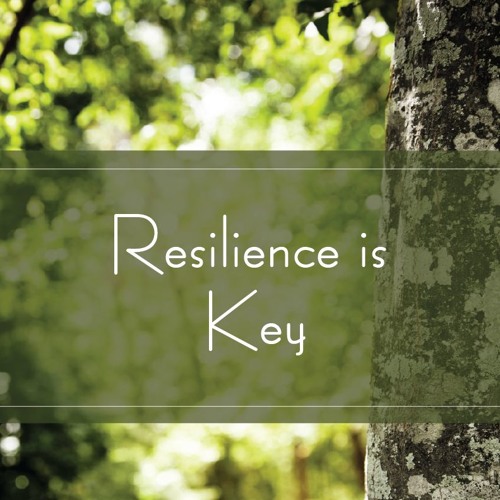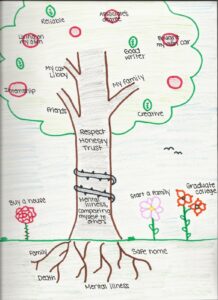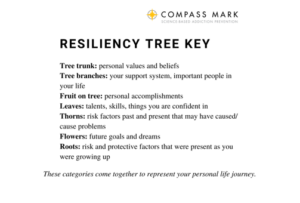
Hello everyone! My name is Kaelyn and I am a current student at Millersville University. I’m interning this semester with Compass Mark and have the opportunity to share with you what I have learned through observing a Compass Mark program called Skills for Life. The focus of my article is on an activity we shared with participants to express ways for building resiliency. This activity helps participants identify their individual and environmental risk and protective factors that affect their opportunities for success, wellbeing, and resiliency despite life’s obstacles. Risk factors negatively affect one’s ability to be as resilient as they can be, while protective factors have the potential to empower resiliency and counteract the negative impact of risk factors. Reflection prompts in this activity encourages participants to identify personal strengths, accomplishments, and life goals that tell a story of potential and encouragement, beyond the consequences of the decisions made resulting in their referral to this program.

The Spanish Observatory of Drugs and Addictions found that cannabis is the most commonly used illicit drug among people aged 14-18 (2019). Because the brain is still developing until about age 25, positive effects of cannabis can lead to increased risk of dependence and use of other illicit drugs, later in life (Fergusson and Boden 2008). Villanueva, Puig-Perez, and Becoña developed “Be Yourself,” a program given in schools, for the prevention of alcohol, tobacco and cannabis use. Bullying, gender stereotypes and aggressiveness are also addressed (2021). Villanueva et. al. created a study with a sample of 893 students, and studied the outcome of prevention from cannabis use in students that received the program opposed to those that did not receive the program. During the 10 sessions of 50 minutes, skills such as effective communication, emotion education, problem solving, education about drugs, and more, are discussed and practiced (2021). Questionnaires were used in the study in order to test the results of the program. The results showed that the students in the Be Yourself program were 2.44 times less likely to use cannabis in the past 12 months, than the students that were not in the program. Furthermore, the probability of use in the past 30 days for students in the program decreased by 2.73 times, while use of those not in the program increased by 3.74 times (Villanueva et. al. 2021). The Skills for Life program utilizes similar tools as the Be Yourself program. This serves as an aid for adolescents and young adults engaging in risky behavior, in order to be resilient and successful in their lives.

The participants in Skills for Life created a Resiliency Tree after answering the prompts. Through this activity, participants are given the opportunity to creatively express their potential, as well as see how the decisions made now can negatively or positively impact their future success in achieving goals. Provided below is my self-reflection, along with a key for reference. Some protective factors I have identified in my life include my family, friends and my cat. I find these factors to help combat the risk factors of mental illness and comparing myself to others in order to be resilient, by the support they give in listening. My family and friends help me see myself for who I am on the inside, and the potential I have in my life. Even though my cat doesn’t talk back to me, she is an emotional support and a source of unconditional love!
I encourage you to complete your own Resiliency Tree, and if you decide to share it, please use the hashtag #CompassMark or #MUMonday! Come back next week for my second and final part of this mini-series.
References
Fergusson, D. M., & Boden, J. M. (2008). Cannabis use and later life outcomes. Addiction, 103, 969–976. https://doi.org/10.1111/j.1360-0443.2008.02221.x.
Observatorio Español de las Drogas y las Adicciones, OEDA. (2019). Encuesta sobre Uso de Drogas en Enseñanzas Secundarias en España (ESTUDES) 1994–2018. Madrid: Delegación del Gobierno para el Plan Nacional sobre Drogas. Ministerio del Interior. Recuperado de
http://www.pnsd.mscbs.gob.es/profesionales/sistemasInformacion/sistemaInformacion/pdf/ESTUDES_2018-19_Informe.pdf
Villanueva, V. J., Puig-Perez, S., & Becoña, E. (2020). Efficacy of the “SÉ TÚ mismo” (be yourself) program in prevention of cannabis use in adolescents. International Journal of Mental Health and Addiction, 19(4), 1214–1226. https://doi.org/10.1007/s11469-019-00219-6